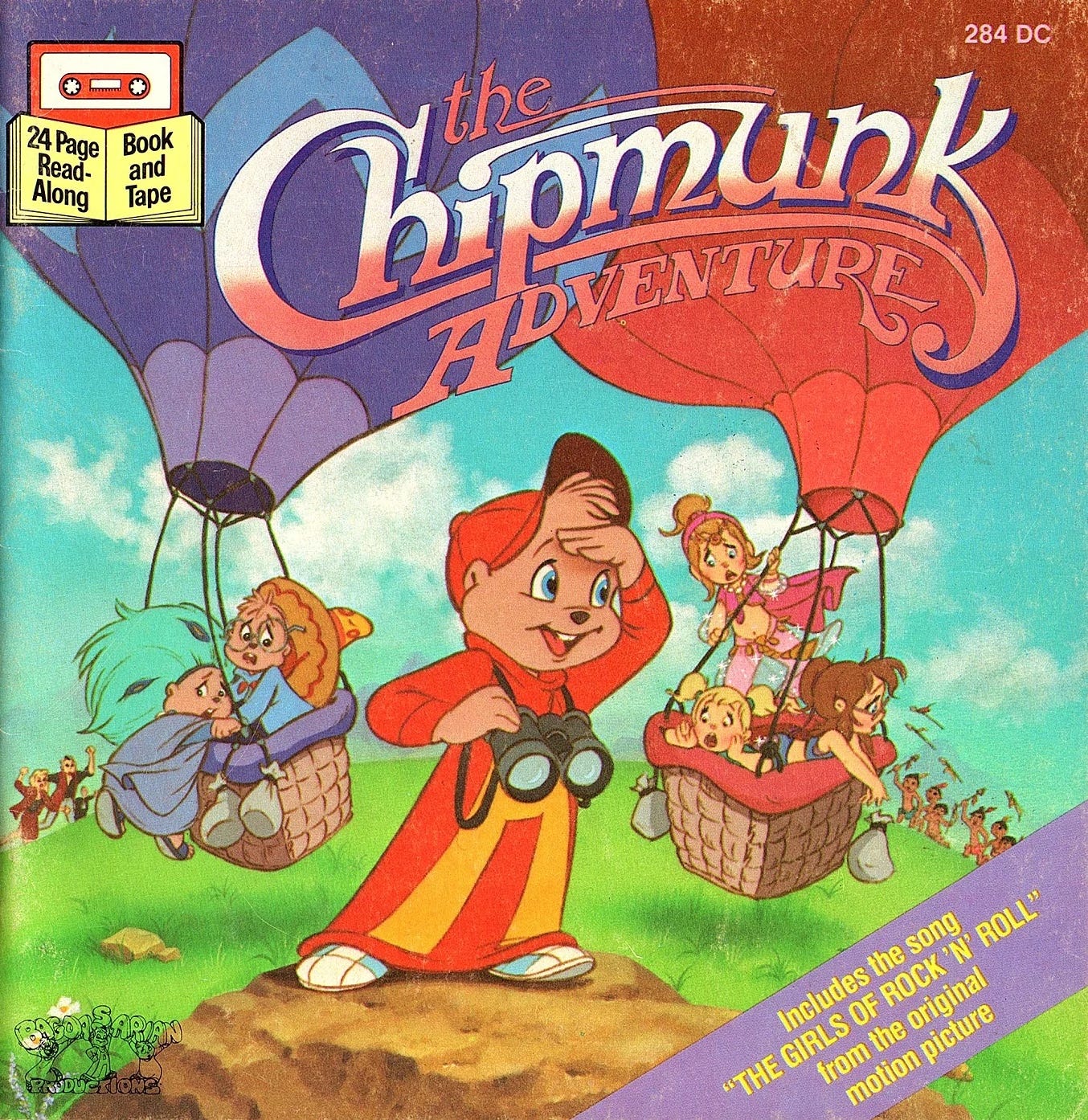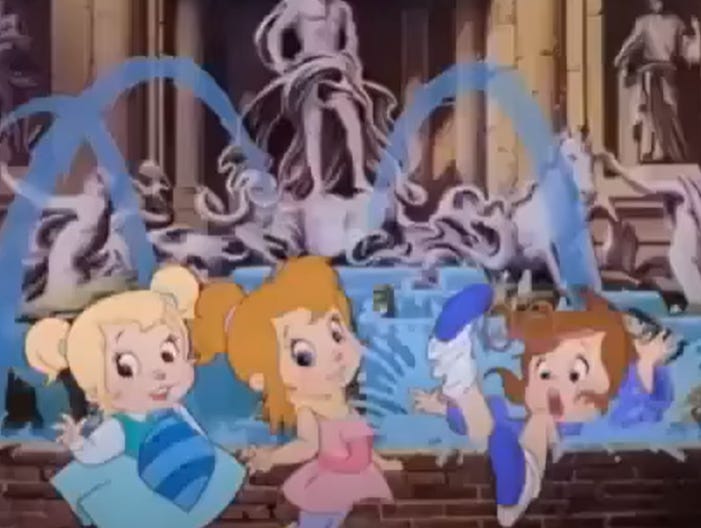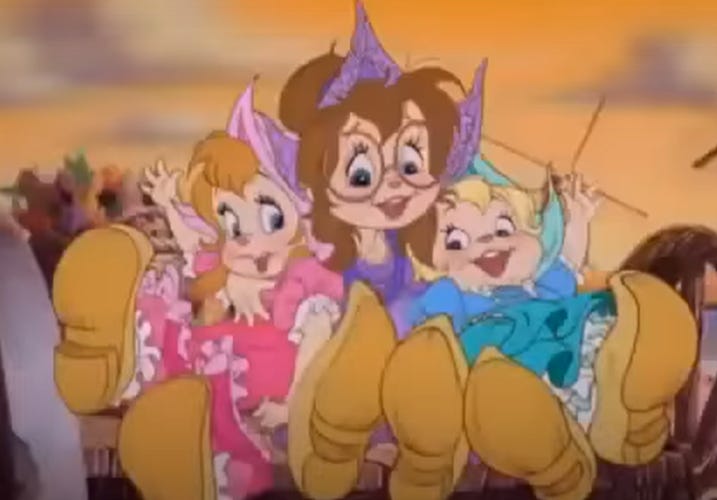Pornography, Pedophilia, and Sadism Found in The Chipmunk Adventure
The Chipmunk Adventure, 1987.
The Chipmunk Adventure is an animated movie starring Alvin and The Chipmunks, that came out in 1987. It was another completely dumbfounded pulp film for middle-class American families to consume in and forget. The movie is free on YouTube and uploaded without care from any corporation trying to claim its IP. I remember watching the film in 1995 as a kid at home, and the VHS tape would play till its end, where I would see nothing but black and white distortion at the end of “The Blue Credit Screen of Death.” Watching it again on YouTube, I can reexamine each still frame, rewind "the digital tape" with only a few clicks, and critically examine what exactly this fever dream was. I can finally look at it as an isolated and deracinated art piece.
This isn’t about the plot. As a child, I didn't understand a word of English or any cultural or social cue. I watch the film, NOT the movie. We watch “a picture play” again with this new consideration. I see my criticisms coming from many unnecessary positions; from art direction, the way characters are drawn, and back to the bad scriptwriting that comes with it as a single presentation. Suppose it is a family movie about going around the world and having fun, we therefore miss the entire point about what film is. Film is not ideological. It’s rather just that. “A thin flexible strip of plastic or other material coated with light-sensitive emulsion for exposure in a camera used to produce photographs or motion pictures.”
Perhaps I'm deconstructing the film, and trying to find “the hidden meaning behind the text.” Or maybe this movie is so lame and gay, that I don't want to engage it as a proper novel, but a series of animated comic bubbles with obsolete and nostalgic cultural hints. I'm not celebrating the 1980s and the pop culture behind it, but instead, examining what an awkward loner or abused child in 1980s Ohio would actually think about this cringe movie, and how it would leave an infinite scar on him.
The most delusional and escapist part of the film is the mid-song, "Off to See the World." It's not about the song. It’s some corny, sentimental fantasy about a romantic getaway. What is interesting, is the act of possession found in the lyrics:
Hey don't you know that we're off to see the world?
We're off to find our dreams
Why are our hearts beating so fast?
Why is there suddenly
A brand new hope inside us that will surely last?
Hey, don't you know that we're off to see the world?
We're off to find things new
So we will follow every clue
Just think there's suddenly
A chance to find if all we've dreamed in dreams was true
I can’t stand the pitch shift within the licks, “A brand new hope” and “A chance to find.” It’s like every single bad Tiffany record rehashed by corporate hacks trying to figure out her obvious pop formula. But that’s the point. An ideological assumption through the romantic feeling of the F pitch. A pitch reserved to feel hopeful, and to chase after dreams.
The Chipettes take a series of camera-shot pictures, framing them all throughout the world, highlighting their memories, experiences, and innocent adventure they are on. But what cultural values are presented here? Like this is something every white kid should know about when growing up, that their bourgeois souls must "travel the world" to find fulfillment. And then the horrible, Yamaha DX7, with its frequency modulation, chimes in as the fulfilling soundtrack, with the cliché chant in front, "Dreams come true."
What dreams?
Ugly animated bodies appear on screen as caricatures of real people living in the 1980s, but instead, come off as slightly homoerotic. The little dog named Sophie cries in a still frame when water drops on her. What was even the purpose of animating that? Another micro story appears about the dog’s emotional well-being. Look at that tear in her eye.
The dog is crying over the abuse of her German master. And the audience sees, through example, what bad parents are. (Possibly, this is indeed reflective, considering there are bad parents from rustbelt America, bringing their children to see this abusive movie.)
"Oh, I'm sorry Sophie," the mom explains as a condescending insult.
And then her dipshit brother throws water on the dog again anyway, out of envy and spite.
"Did the spoiled brat get wet?"
This, in turn, is common abuse found in a class of people trying to act a certain way. Suppose the dog is an innocent child. The innocent dog is recorrected and insulted for expressing common emotions. Eventually, the dog will become an abusive parent, if continuing with these condescending insults.
...And think for a second, that fat ass Theodore is always eating food from different parts of the world, and eating himself to death. As if we are supposed to laugh at his misery of being fat, addicted, and hopeless. Look at him.
Some say that a living, breathing individual is watching a movie, and has profound ownership over it. It is considered a hobby for some to say "I'm watching my movie. “My!” It's their movie, not yours. The movie does not physically exist, or, it is the attachment, or trait, of someone’s personality. The movie is just a hobby, or a meditation that the viewer is having, kind of like eating a cheeseburger. Could I say The Chipmunk Adventure is also my movie? With that kind of responsibility, the text and pictures could be anything I want them to be, because it’s my movie. And if you were to insult or perceive the movie as different from the way I see it, you are hurting and offending me!
I can make the movie into a film, and reconstruct the narrative, or deconstruct it, into something else. In doing so, I became a sadist. I’m inflicting my perversions onto the film because it’s my movie.
A Twitter account called “Molly McGee Screencaps” shows just that. It is a Twitter account reposting a collection of still screenshots from the 2021 Disney cartoon show, The Ghost and Molly McGee. But why? I'm not watching the show or any of the pictures being animated. It’s like I can stop the film, on mute, while watching The Chipmunk Adventure, and try and guess what is happening.
And it's just that. A still, single picture.
One little picture has an ideological assumption to it. I don't need to watch the show or need to know what it is about. I don’t even have to figure out the political biases or the minor details about a sophisticated, romantic-comedy plot. One comic frame has all the assumptions. It becomes my still frame. Just like my movie. It's not about Molly McGee’s ideology about interracial harmony or upholding neoliberal capitalist values of individualism and egalitarianism. That’s all a ruse. I see something different.
What if an 18-year-old is watching it, and finds Molly attractive? What if, he is also aroused by her? And he develops a desire for a fictional character? Next thing you know, the teenager is searching cartoon porn of Molly on Rule 34 or any Booru image search.
It's now a pornographic film! We bring sadism to the art in question.
…And it can get more deep than that. Here, Alvin is Adonis, Theodore is Dionysus, and Simon is Socrates!
There is also a scene of sexual seduction, where The Chipettes are hanging from the balloon ropes, like strippers, waving their bodies to and through, and thrusting out like penetration.
And why is her ass out like that?
And here she goes, ready to scream.
Meanwhile, Alvin and his gang get lost in a jungle and then captured by an alien tribe. Both Alvin and Simon are stripped naked, their bodies out, tied up, and ready for punishment.
How is this not homoerotic or sadistic? Let alone, pedophilic.
Now to the whole parent worship, as if the audience is now supposed to admire, love, and adore the relationship between a penguin parent and her child. All I can hear is the nonsensical echo, drone, and eerie chant of the muzak shrieking from the fatty Chipette, Eleanor. It's like social propaganda found in Reagan-era shorts, like Cartoon All-Stars to the Rescue to promote some kind of harmony within middle-class submission (and being against drugs is a way to fight that nihilism).
All of it is a blur anyway. Imagine watching the entire movie on grainy film. I remember 1997 and the tail end of analog film used in common movie theaters. "Most spots are caused by dust, which settles out of the air and onto the film." It's bizarre seeing Robin Williams in a remake of The Absent-Minded Professor in some dead part of America and seeing big black spots in the corner during boring and platonic dialogue. The film becomes an artistic medium, full of blemishes and errors. We step out of the theater and realize it’s just a Stan Brakhage light projection, kind of like what James Turrell does.
The little penguin cries back to the Chipette. "I'm sad, I miss my mommy. I want to be back with my mommy." This sentimental and unrealistic dream is projected to the vision of a bourgeois utopia of a picture-perfect nuclear family living with Christian values. It’s the same retarded family going to see this film in theaters in 1987. Yet, the same penguin that cries is the same dog that cries against its abusive owner. The dog suffers from a horrible family, as the penguin suffers because it naturally wants a good family, just like the dog. Both are children crying about abuse. Only a child abuser would get off on this. The prey is the child crying for help, and the predator wants to see the child cry. This is the sadistic rape of children, portrayed through a harmless and dumbfounded movie for the bourgeoisie.
The parent penguins are just going to cry that their kid is dead, and never coming back. This is the trauma projected onto the audience. What if this was your child? The constant and unnecessary projection of guilt is a turn-on for the sadist.
Think about those pictures taken in “Off to See The World.” They were taken in a series by The Chipettes. It had something to do with their “dreams.”
The dream is also a metaphor.
I was reading Dennis Cooper's Frisk (published in 1992) right before watching The Chipmunk Adventure, and I can see why Bret Easton Ellis admires Cooper’s work. Cooper begins and ends the novel with a short chapter on the description of a faded Polaroid, that of a dead child, tied up, and mutilated. Both chapters are called "infinite" (or the symbol itself, “∞”) to presume that the trauma is developed through a single picture. From Chipmunks to Molly McGee, we can make those connections.
The narrator is "Dennis," himself or a fictional character. But I'll spoil it here, In the last chapter of “Infinite,” it is revealed that the Polaroid picture was manufactured. In return, this means that Cooper could be arguing that pornography, and the nature of beauty, stirs people into uncontrollable sadism, and thus creates the killer. The picture wasn't real, but the killer wanted it to be real.
Imagine pornography as photography. Imagine too there are “actors” and “actresses” in a hypothetical situation where they both have sex, and porn is measured in terms of whether the arousal was beautiful or not. But what if there is only arousal and no beauty? What if arousal is confused with beauty, and therefore partakes in depravity and hedonism? Thus porn becomes a series of sadistic pictures, done by sadistic people, who have a hobby of being sadistic and perverted as a profession.
But did any of it happen?
Perhaps being “gay,” or having a subculture around it justifies acts of hedonism, murder, and trauma projection, and less about identity politics or Platonism. What if the gay man is indeed an evil sadist, and suppressing his PTSD through harm, and by acting out upon others who also have imagined beliefs?
The Chipmunk Adventure is a sadist fantasy, in that undesirable values are brought upon the viewer. It instills guilt, feeds into envy, and projects a false consciousness of the good life. And importantly, the ugly art is like a Kaleidoscope, multiplying irrational anxieties. From all the bad background characters, all the still frames, and all the ideological and technological assumptions.
There is no plot. Only the projection of the trauma. It’s what a “minor attractive person” finds exciting. The question is, why would the pedophile find this film arousing?
-pe
1-5-2023




















